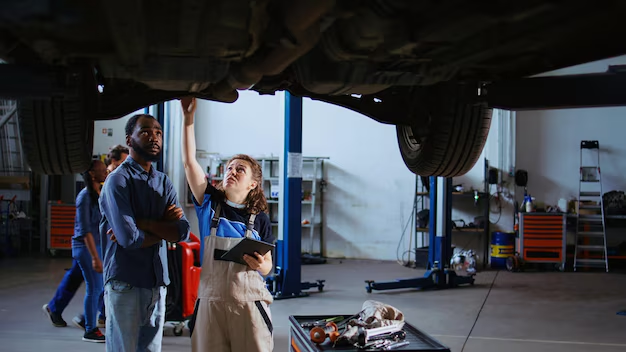
When Should You Replace Fleet Vehicles? Key Signs for Milwaukee Fleets
Managing a fleet in Milwaukee comes with its own set of challenges. Between the unpredictable Midwest weather, busy city traffic, and the natural wear of constant use, fleet vehicles don’t last forever. At some point, the question arises: is it better to keep repairing your current vehicles or start planning for fleet renewal?
Knowing when to replace fleet vehicles is not only about cost—it’s about safety, reliability, and long-term efficiency. Replacing a vehicle too soon can waste resources, but keeping one too long can lead to frequent breakdowns, lost productivity, and higher repair bills. Understanding the balance is key for smart fleet management.
Let’s break down the major signs that indicate when it may be time for fleet vehicle replacement in Milwaukee and how businesses can make the transition smoothly.

High Mileage and Wear
Mileage is one of the clearest indicators of when to replace fleet vehicles. Many fleet vehicles are designed to last well beyond 100,000 miles, but by the time they reach this milestone, wear on major components like the engine, transmission, and suspension becomes more noticeable.
For delivery vans, service trucks, or company cars that are used daily, those miles add up quickly. Once vehicles cross 150,000 to 200,000 miles, the likelihood of costly repairs increases. Milwaukee’s stop-and-go traffic, winter salt exposure, and rough roads only speed up that process.
A high-mileage vehicle may still run, but the performance and reliability often decline. If repairs are becoming more frequent and expensive, replacement may be more cost-effective than continuous maintenance.
Rising Repair Costs
Another major red flag is when repair bills begin to outweigh the value of the vehicle. A good rule of thumb for Milwaukee fleets is the 50% rule: if repair costs exceed half the vehicle’s current value, it’s time to think about replacement.
Frequent repairs don’t just impact your bottom line—they also cause downtime. Every day a fleet vehicle is in the shop is a day your business loses productivity. That lost time is often worth more than the repair itself.
Tracking repair history helps identify patterns. If the same vehicle has needed major services multiple times in a short period, chances are it will continue to be a drain on resources.
Safety Concerns
Fleet safety should never be compromised. Older vehicles often lack modern safety features such as advanced braking systems, blind-spot monitoring, or collision avoidance technology. Even if your fleet vehicles were reliable when purchased, outdated safety standards can put your drivers and business at risk.
In Milwaukee, where icy winter roads and congested highways create additional hazards, safety is especially important. If a fleet vehicle struggles with braking performance, stability, or reliability during harsh conditions, it may be time to prioritize replacement over repair.
Fuel Efficiency Decline
Fuel costs add up quickly for any business that relies on a fleet. Older vehicles typically consume more gas than newer models, especially if they’re no longer operating at peak efficiency. With fuel prices fluctuating in Milwaukee, this can significantly impact your bottom line.
Modern vehicles are designed with better fuel economy in mind. Switching to newer fleet models can reduce fuel expenses, improve sustainability, and provide more predictable operating costs. Over time, those savings can outweigh the upfront investment of replacing older vehicles.
Outdated Technology and Features
In addition to safety, technology plays a big role in fleet management today. Many newer vehicles offer advanced telematics systems, GPS tracking, maintenance alerts, and even driver behavior monitoring. These tools help companies cut costs, streamline operations, and improve accountability.
If your fleet vehicles lack these technologies, you may be missing out on opportunities to increase efficiency and safety. Replacing outdated models with newer ones that integrate with fleet management software can provide a long-term advantage.
Frequent Breakdowns and Downtime
Reliability is at the heart of fleet operations. When a vehicle breaks down, it doesn’t just require a repair—it disrupts schedules, frustrates customers, and impacts overall business reputation.
In Milwaukee, where weather conditions can make roadside breakdowns especially inconvenient and dangerous, downtime can quickly spiral into a bigger issue. If breakdowns are becoming a regular occurrence, it may be time to stop investing in temporary fixes and instead invest in a more reliable replacement.
Image and Professionalism
For many businesses, fleet vehicles are the first impression customers see. Worn-out, rusting, or outdated vehicles can send the wrong message about your company’s professionalism and reliability.
In a competitive market like Milwaukee, appearances matter. A modern, well-maintained fleet signals trustworthiness and efficiency. If your vehicles no longer reflect the image you want to project, upgrading them could benefit not only operations but also brand reputation.
Calculating the Right Timing for Replacement
Every business has different needs, so there isn’t a one-size-fits-all answer to when fleet renewal makes sense. However, here are a few guidelines Milwaukee fleet managers can use:
- Track lifecycle costs: Compare ongoing repair, fuel, and downtime costs against the investment in a new vehicle.
- Monitor mileage and usage: High-use vehicles may need replacement sooner than those with lighter schedules.
- Consider resale value: Replacing a vehicle before it loses all value may provide better return on investment.
- Factor in new vehicle benefits: Savings in fuel, maintenance, and insurance may offset the cost of replacement faster than expected.

Why Milwaukee Fleets Trust Professional Guidance
Deciding when to replace fleet vehicles isn’t always simple, but professional insight can make the process easier. Partnering with an experienced auto repair shop helps fleet managers weigh the costs of repair versus replacement and make smarter, data-backed decisions.
At Sanfelippo Auto Repair in Milwaukee, we’ve spent over 30 years helping local businesses keep their vehicles road-ready. Our ASE-certified technicians can assess the condition of each vehicle, provide honest repair recommendations, and advise on whether replacement is the smarter option. With over 500 vehicles serviced annually, we understand the balance between cost, safety, and reliability that fleets need.
A dependable fleet is the backbone of your business. If your vehicles are showing signs of high mileage, costly repairs, declining fuel efficiency, or frequent downtime, it may be time to consider replacement. Don’t wait for unexpected breakdowns to disrupt your operations. Contact Sanfelippo Auto Repair in Milwaukee today to schedule a fleet evaluation and keep your business moving forward with confidence.


